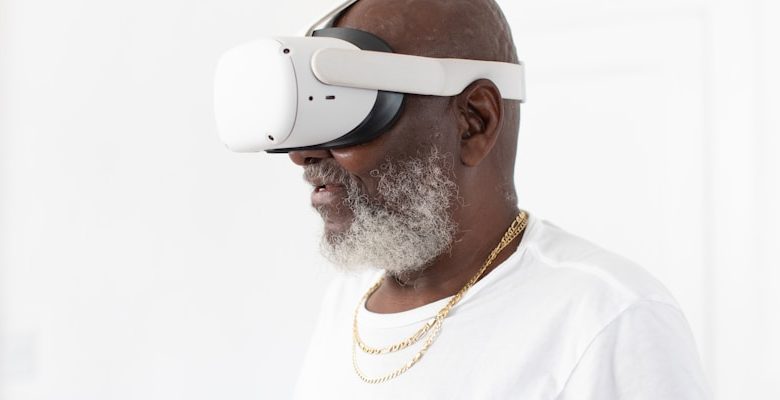How Virtual Reality Will Change the Way We Experience the World

- Immersive Experiences: Virtual Reality’s Impact on Perception
- Exploring New Realities: The Evolution of VR Technology
- Revolutionizing Entertainment: Virtual Reality in Gaming and Film
- Virtual Travel: Experiencing the World from the Comfort of Home
- Enhancing Education: VR’s Role in Learning and Training
- The Future of VR: Innovations and Possibilities
Immersive Experiences: Virtual Reality’s Impact on Perception
Virtual reality technology has revolutionized the way we perceive and experience the world around us. By immersing users in a digital environment that simulates reality, virtual reality has the potential to redefine our understanding of space, time, and sensory perception.
Through the use of VR headsets, users can transport themselves to virtually any location, whether it be the top of a mountain, the depths of the ocean, or even outer space. This immersive experience allows individuals to explore new worlds and gain a deeper appreciation for the wonders of the universe.
One of the most intriguing aspects of virtual reality is its impact on perception. By manipulating visual and auditory stimuli, VR can alter the way we perceive our surroundings, leading to a heightened sense of presence and immersion. This shift in perception can have profound implications for how we interact with the world and each other.
As virtual reality technology continues to advance, we can expect to see even more profound changes in the way we experience the world. From educational simulations to therapeutic applications, the possibilities for VR are endless. As we embrace this new era of immersive experiences, we are sure to see a transformation in the way we perceive and interact with the world around us.
Exploring New Realities: The Evolution of VR Technology
Virtual reality (VR) technology has come a long way in recent years, evolving at a rapid pace to offer users a truly immersive experience like never before. With advancements in hardware and software, VR has grown from a niche technology to a mainstream phenomenon that is changing the way we interact with the world around us.
One of the key developments in VR technology is the improvement in visual fidelity. High-resolution displays and advanced graphics processing units have made virtual environments more realistic and engaging. This means that users can now explore new worlds with stunning detail and clarity, making the experience feel more lifelike than ever before.
Another important aspect of VR technology evolution is the advancement in tracking and motion sensors. These sensors allow for more precise movement tracking, enabling users to interact with virtual objects in a more natural and intuitive way. This level of immersion creates a sense of presence that makes users feel like they are truly part of the virtual world they are exploring.
Furthermore, the development of haptic feedback technology has enhanced the VR experience even further. By providing tactile feedback through controllers or wearable devices, users can feel the virtual world in addition to seeing and hearing it. This sensory immersion adds a new dimension to the VR experience, making it even more compelling and engaging.
Overall, the evolution of VR technology has opened up a world of possibilities for how we experience and interact with the world around us. From realistic simulations to virtual social interactions, VR has the potential to revolutionize the way we learn, play, and communicate. As the technology continues to improve and become more accessible, we can expect to see even more exciting developments that will shape the future of virtual reality.
Revolutionizing Entertainment: Virtual Reality in Gaming and Film
Virtual reality technology has been revolutionizing the entertainment industry by providing immersive experiences in gaming and film. This cutting-edge technology allows users to step into a virtual world where they can interact with their surroundings in ways never before possible.
In the world of gaming, virtual reality has taken gameplay to a whole new level. Players can now feel like they are actually inside the game, with 360-degree views and realistic sounds that transport them to another reality. This level of immersion creates a more engaging and thrilling experience for gamers, making them feel like they are part of the action.
Similarly, in the film industry, virtual reality has opened up a whole new realm of possibilities. Filmmakers can now create interactive movies where viewers can choose their own path and experience the story from different perspectives. This interactive storytelling not only enhances the viewing experience but also allows for a more personalized and engaging way to consume content.
As virtual reality technology continues to advance, we can expect to see even more groundbreaking developments in gaming and film. From realistic graphics to interactive storytelling, virtual reality is changing the way we experience entertainment, blurring the lines between the real world and the virtual one.
Virtual Travel: Experiencing the World from the Comfort of Home
In today’s digital age, virtual reality (VR) technology is revolutionizing the way we experience the world around us. With VR headsets becoming more accessible and affordable, people can now embark on virtual travel adventures from the comfort of their own homes. This innovative technology allows users to immerse themselves in realistic 3D environments that mimic real-world locations, providing an unparalleled sense of presence and exploration.
Through VR travel experiences, users can visit iconic landmarks, explore exotic destinations, and even interact with local cultures without ever leaving their living rooms. From the bustling streets of Tokyo to the serene beaches of the Maldives, the possibilities for virtual travel are endless. By simply putting on a VR headset, travelers can instantly transport themselves to any corner of the globe, opening up a world of new experiences and opportunities for exploration.
One of the key advantages of virtual travel is its accessibility to individuals who may not have the means or ability to embark on physical journeys. Whether due to financial constraints, physical disabilities, or other limitations, VR technology offers a way for everyone to experience the wonders of the world in a way that was previously unimaginable. Additionally, virtual travel allows users to customize their experiences, choosing where they want to go and what they want to see, creating personalized adventures tailored to their interests and preferences.
As virtual reality technology continues to evolve and improve, the possibilities for virtual travel are only expected to grow. With advancements in graphics, audio, and interactivity, VR experiences will become even more immersive and lifelike, blurring the lines between the virtual and physical worlds. Whether it’s exploring ancient ruins, diving into the depths of the ocean, or soaring through the skies, virtual travel offers a unique way to broaden horizons, expand knowledge, and satisfy wanderlust – all from the comfort of home.
Enhancing Education: VR’s Role in Learning and Training
Virtual reality (VR) technology has the potential to revolutionize the way we learn and train in various fields. By immersing users in realistic and interactive environments, VR can enhance education by providing hands-on experience and engaging learning opportunities.
One of the key benefits of VR in education is its ability to simulate real-world scenarios, allowing students to practice skills in a safe and controlled environment. This can be particularly useful in fields such as medicine, where trainees can perform virtual surgeries or diagnose patients without any risk to real-life patients.
Furthermore, VR can make learning more engaging and interactive by allowing students to explore concepts in a three-dimensional space. This can help improve retention and understanding of complex subjects by making them more visually appealing and easier to comprehend.
In addition, VR can also provide access to educational resources and experiences that may not be available in traditional classrooms. For example, students can take virtual field trips to historical sites or interact with experts in various fields through virtual lectures and workshops.
Overall, VR has the potential to transform the way we experience learning and training by providing immersive, interactive, and engaging educational experiences that can enhance understanding and retention of knowledge in various fields.
The Future of VR: Innovations and Possibilities
The future of virtual reality (VR) is filled with exciting innovations and endless possibilities that will revolutionize the way we experience the world around us. With advancements in technology and an increasing number of applications for VR, the potential for growth in this field is truly limitless.
One of the key innovations in VR is the development of more immersive and realistic experiences through the use of advanced graphics and sensory feedback. This allows users to feel like they are truly present in a virtual environment, whether it’s exploring a far-off planet or interacting with historical figures.
Another exciting possibility for the future of VR is its integration with other emerging technologies such as artificial intelligence (AI) and the Internet of Things (IoT). By combining these technologies, VR can offer personalized and interactive experiences that are tailored to the individual user’s preferences and behaviors.
Furthermore, the potential for VR to revolutionize industries such as healthcare, education, and entertainment is immense. From virtual medical simulations for training healthcare professionals to immersive educational experiences for students, VR has the power to transform how we learn, work, and entertain ourselves.
As VR continues to evolve and expand, it will open up new opportunities for businesses and individuals alike. Whether it’s creating virtual storefronts for e-commerce or developing virtual travel experiences for tourists, the possibilities for innovation are endless. In conclusion, the future of VR is bright, and it is only a matter of time before we see its full potential unleashed in ways we never thought possible.



